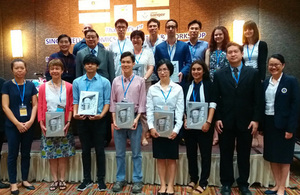Newton Fund supports single-cell genomics in Thailand
The Newton Fund supported Mahidol University and the Wellcome Sanger Institute to organise the first conference on "Single Cell Genomics" to showcase advanced high-throughput techniques.

Single-cell genomics in Thailand
One of the most important paradigm-shifting events of the 21st century biology is the advancement of high-throughput techniques. These have allowed scientists to investigate the dynamics of multiple genes, transcripts and proteins at the same time, giving rise to a large amount of “omic” data. However, the techniques have yet to reach their full potential in solving the real world’s problems such as infectious diseases and climate changes, due to their insufficient resolution.
A team of Thai and UK scientists, with support from the Newton Fund, is attempting to mitigate this setback and expedite molecular biology research by implementing “single-cell genomics” for the first time in Thailand.
The cutting-edge technique will, for the first time, empower scientists to show individual cells responding to environmental changes, thus increasing their understanding of regulatory mechanisms. This will in turn enable the researchers to innovate more, such as producing effective vaccines against deadly infectious diseases, or creating plants that are resilient to climate change. As part of the programme, the first single-cell genomics facility has been established at the Faculty of Science, Mahidol University here in Thailand.
To showcase these technological advances, the first conference and workshop on single-cell genomics was held between 16-18 May 2018 in Bangkok. Invited speakers included 8 expert scientists from the Wellcome Sanger Institute, UK, and top researchers from Thailand. The conference was attended by more than 120 researchers from different institutes across Thailand.
These projects were made possible by the Newton Advanced Fellowship through the Royal Society and Thailand Research Fund (to Asst Prof Varodom Chaorensawan and Dr Sarah A Teichmann), and 2 Newton Mobility grants through the Royal Society and Office of Higher Education Commission (to Asst Prof Varodom Chaorensawan and Dr Martin Hemberg, and to Asst Prof Ponpan Matangkasombut Choopong and Dr Sarah A Teichmann).